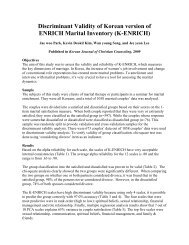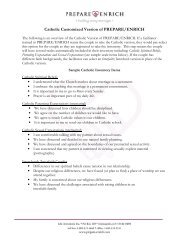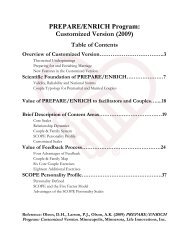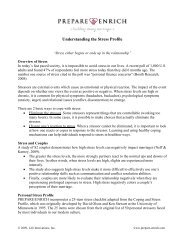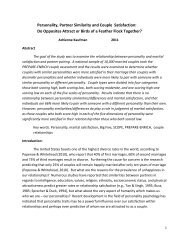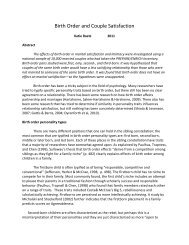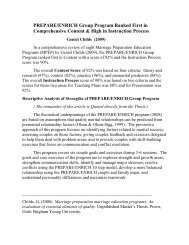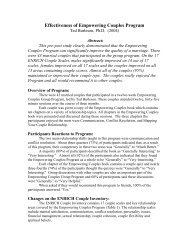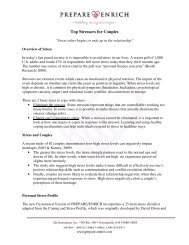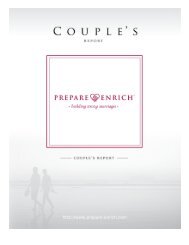PREPARE/ENRICH Customized Version
PREPARE/ENRICH Customized Version
PREPARE/ENRICH Customized Version
Create successful ePaper yourself
Turn your PDF publications into a flip-book with our unique Google optimized e-Paper software.
http://www.prepare-enrich.com
<strong>PREPARE</strong>/<strong>ENRICH</strong><strong>Customized</strong> <strong>Version</strong>Facilitator: Richard M. Salmeron Date Completed: 02/02/2013Couple Names:MarioJenniferCouple Login Code:JXNJFP-C9TPXTCustomizations:Dating Possibility of Children in FutureProtestant Cultural/Ethnic DifferencesThis Facilitator's Report is not to be given to the couple. It is for the Facilitator's use only.Please print a copy of the Couple's Report for the couple.ContentsReport Section PageBackground Information 3Couple Typology / Strength & Growth Areas 4Overall Satisfaction & Idealistic Distortion 5Relationship Dynamics 6Commitment & Abuse 7Personal Stress Profile 8Core Relationship Categories 9-17Additional <strong>Customized</strong> Categories 18-20Couple Map 21Family Map 22SCOPE Personality Scales 23-25<strong>PREPARE</strong>/<strong>ENRICH</strong>© Copyright, 2008 - 2013Life Innovations, Inc.2
Background InformationQuestion Mario JenniferGender Male FemaleAge Range 26 - 30 31 - 35Ethnic Background Hispanic/Latino CaucasianEducation CompletedSome College/TechnicalSchoolGraduate/ProfessionalReligious Affiliation Other OtherWhich category best describes yourarea of employment?Other Health Care or Social ServicesRole at work Support Staff Trained ProfessionalEmployment Status (paid) Full-time Full-timeIndividual Yearly Income $20,000 - $29,999 $50,000 - $74,999What is your birth position in yourfamily?Second ThirdNo. children in your family Two FourWhere do you live? Suburban Area Suburban AreaWhat is your current livingarrangement?With parents or other familymembersLive aloneHow long known partner? 0-6 months 0-6 monthsNo. children you have None NoneHow many children do you want? Three TwoIs the woman pregnant? No NoNo. times broken up Never NeverNumber of previous marriages 0 - never married before 0 - never married beforeParents' marital status Married Divorced, both singleRaised by Both Biological Parents Both Biological Parents3
Couple Typology (Core Scales)Vitalized Couple TypeBased on the PCA scores across the core categories, this couple is best categorized as a Vitalized Couple. Vitalized couples typicallyhave many strength areas and a high level of relationship satisfaction. Still, they may have some growth areas in their relationshipthat can be improved. Strong relationship skills should provide a good foundation for improving any growth areas.Based on past research with thousands of couples, <strong>PREPARE</strong>/<strong>ENRICH</strong> categorizes couple relationships into one of four commonpatterns:Vitalized couples are typically most satisfied with their relationship, skilled in communication and conflict resolution.Harmonious couples also enjoy high levels of satisfaction across most areas of their relationship.Conventional couples are often highly committed to one another, but not as skilled in communication or conflict resolution.Conflicted couples have a lower level of satisfaction and often struggle with many areas of their relationship.Strength and Growth AreasLevels of Positive Couple AgreementRelationship Strengths (PCA=80 - 100%)Areas with High Couple AgreementPossible Relationship Strengths (PCA=50 - 70%)Areas with Moderately High Couple AgreementPossible Growth Areas (PCA=30 - 40%)Areas with Moderately Low Couple AgreementCore and <strong>Customized</strong> ScalesCommunicationConflict ResolutionCultural/Ethnic IssuesParenting ExpectationsSexual ExpectationsSpiritual BeliefsCharacter TraitsLeisure ActivitiesPartner Style & HabitsRelationship ExpectationsFamily & FriendsFinancial ManagementGrowth Areas (PCA=0 - 20%)Areas with Low Couple Agreement4
Overall SatisfactionThe graphs below plot the Overall Satisfaction for each individual and the couple based on the Core Scales.Idealistic DistortionIdealistic Distortion measures the extent to which a person distorts their relationship in a positive direction.Interpretation of IdealismA high score (above 65%) indicates that a persondescribes their relationship in an overly positivemanner and sees it through "rose colored" glasses.A lower score (below 40%) indicates a more realisticapproach to describing the relationship.Mario is very idealistic about their relationship andtends to deny or minimize problems.Jennifer may be somewhat realistic, but sometimesdenies or minimizes problems in their relationship.Revised Individual ScoresIn order to provide more accurate individual scoresfor each category, each person's Individual Scoresare corrected based on how high their score is onIdealistic Distortion. Revised Individual scores aregraphed and defined in many of the followingrelationship categories.Strongly Disagree1Disagree2Undecided3Agree4Strongly Agree5Mario Jennifer Idealistic Distortion Items4 4 Every new thing I have learned about my partner has pleased me.5 1 I have never regretted my relationship with my partner.5 5 My partner always gives me the love and affection I need.4 4 My partner and I understand each other completely.5 3 My partner completely understands and sympathizes with my every mood.5 4 My partner has all the qualities I've always wanted in a mate.5 4 We are as happy as any couple could possibly be.5
Relationship DynamicsAssertiveness is the ability to express one's feelings and ask for what one wants.Mario:Jennifer:Very HighMario is good at openly expressing thoughts and feelings, and can easily ask for what he/she wants inthe relationship.HighJennifer is good at expressing thoughts and feelings, and is able to ask for what he/she wants in therelationship.Self Confidence focuses on how good one feels about oneself and their ability to accomplish what they wantin life.Both:Very HighBoth individuals have very high levels of Self Confidence and positive self-esteem. They both feel verysure of their ability to effectively accomplish what they want in life.Avoidance is the tendency to minimize issues and reluctance to deal with issues directly.Both:Very LowBoth individuals scored very low in Avoidance and will often be open to identifying and discussingissues in their relationship.Partner Dominance focuses on how much one feels controlled or dominated by their partner.Mario:Jennifer:Very LowMario scored in the very low range in Partner Dominance and does not feel his/her partner isdominant, controlling, or interested in managing his/her life.AverageJennifer scored in the moderate range in Partner Dominance and sometimes feels his/her partner isdominant, controlling, or occasionally interested in managing his/her life.6
CommitmentStrongly Disagree1Disagree2Undecided3Agree4Strongly Agree5Questions Mario JenniferI am no longer interested in datingother people.I am very committed to ourrelationship.I believe my partner is very committedto our relationship.Strongly Agree Strongly AgreeStrongly Agree Strongly AgreeStrongly Agree Strongly AgreeAbuseNever1Seldom2Sometimes3Often4Very Often5Questions Mario JenniferHave your parents ever had problemswith alcohol or drug use?Have you ever had problems withalcohol or drug use?Has your partner ever had problemswith alcohol or drug use?Have you ever observed abusebetween your parents?Were you ever abused by yourparents?Have you ever been abused by yourcurrent partner?Have you ever been abused by anyoneelse?Do you struggle with unhealthy sexualbehavior or use of pornography?Does your partner struggle withunhealthy sexual behavior or use ofpornography?Often Very OftenVery Often Very OftenVery Often Very OftenVery Often SometimesVery Often NeverNever NeverSometimes NeverNever SeldomSeldom Never7
Personal Stress ProfileThe Personal Stress Profile examines each individual's personal stress level over the last year. Stress levelsare based on responses to 25 common sources of personal stress.Mario appears to have a low level of frustration orpersonal stress. While stress may create somedemands on time, patience, and energy, it appears tobe at a manageable level. It may still be helpful toidentify and understand effective coping resourcesfor stress.Jennifer has very few frustrations or challenges thatare causing personal stress. When stressful situationsare encountered, it is likely that effective copingstrategies are being used to manage the frustrationsof daily life.Never1How often have these issues created stress for you?SeldomSometimesOften234Very Often5MarioTop 10 StressorsOftenOveruse of alcohol or smokingPoor health of other family membersYour current housing arrangementYour parentsSometimesFeeling emotionally upsetLack of sleepOwe too much money (credit cards, loans, etc.)Too much to do around the homeYour friendsYour relationship with relativesJenniferTop 10 StressorsSometimesLack of time for friendsLack of time for yourselfTime away from familyToo much time at work or schoolToo much to do around the homeHelp this couple compare their lists of top stressors. It is not uncommon for their lists to be somewhatdifferent. Take a moment to help them discuss where things are similar and where they are different. Keyresources for coping with stress include healthy communication, conflict resolution, flexibility, and closeness.<strong>PREPARE</strong>/<strong>ENRICH</strong> Exercises: Identifying Most Critical Issues, Balancing your Priorities8
CommunicationThe Communication category measures how couples feel about the quality and quantity of communication intheir relationship. It explores how they share feelings, understand, and listen to one another.Both individuals feel positive about theircommunication and how they share feelings and listento each other.Relationship Strength: The couple has positiveagreement with most of the items in this category.Review some of their Agreement Items, whichrepresent strengths in their relationship. They may alsohave 1 or 2 Disagreement, Indecision, or Special Focusitems to discuss. Congratulate them! Having strongcommunication skills provides a great foundation formany aspects of their relationship.Strongly Disagree1Disagree2Undecided3Agree4Strongly Agree5Mario Jennifer Positive Couple Agreement (90%)1 2 - At times it is hard for me to ask my partner for what I want.5 5 + I am very satisfied with how my partner and I talk with each other.5 5 + I can express my true feelings to my partner.1 1 - I wish my partner were more willing to share his/her feelings with me.1 2 - It is difficult for me to share negative feelings with my partner.4 5 + My partner is a very good listener.2 2 - My partner often doesn't understand how I feel.1 2 - Sometimes I have trouble believing everything my partner tells me.1 1 - When we are having a problem, my partner often refuses to talk about it.Disagreement (10%)2 4 - My partner sometimes makes comments that put me down.Indecision (0%)Special Focus (0%)<strong>PREPARE</strong>/<strong>ENRICH</strong> Exercises: Creating a Wish List using Assertiveness & Active Listening, Daily Dialogueand Daily Compliments9
Conflict ResolutionThe Conflict Resolution category looks at a couple's ability to discuss and resolve differences. It measures howeffectively couples share opinions, ideas, and feelings, even during times of conflict.Both individuals feel positive about their conflictresolution and their ability to discuss and resolvedifferences.Relationship Strength: The couple has positiveagreement with most of the items in this category.Review some of their Agreement Items, whichrepresent strengths in their relationship. They may alsohave 1 or 2 Disagreement, Indecision, or Special Focusitems to discuss. Congratulate them! The ability toeffectively discuss and resolve differences is afoundational skill for a strong relationship.Strongly Disagree1Disagree2Undecided3Agree4Strongly Agree5Mario Jennifer Positive Couple Agreement (100%)1 2 - At times I feel some of our differences never get resolved.2 2 - At times my partner does not take our disagreements seriously.5 5 + Even during disagreements, I can share my feelings and ideas with my partner.1 2 - I go out of my way to avoid conflict with my partner.1 2 - My partner and I have different ideas about the best way to solve our disagreements.1 2 - Sometimes we have serious disputes over unimportant issues.2 2 - To avoid hurting my partner's feelings during an argument, I tend to say nothing.2 2 - To end an argument, I tend to give in too quickly.1 1 - When we argue, I usually end up feeling responsible for the problem.5 4 + When we discuss problems, my partner understands my opinions and ideas.Disagreement (0%)Indecision (0%)Special Focus (0%)<strong>PREPARE</strong>/<strong>ENRICH</strong> Exercises: 10 Steps for Resolving Conflict, How to Take a Time-Out, Seeking andGranting Forgiveness10
Partner Style & HabitsThe Partner Style & Habits category measures each person's satisfaction with the personal characteristics andhabits of their partner. It looks at each person's relationship style and habits as expressed in their behavior.Mario feels positive about the personality traits, habits,and behaviors of his/her partner.Jennifer feels generally good about the personalitytraits, habits, and behaviors of his/her partner, but hassome concerns that may need to be discussed.Possible Strength: The couple agreed on several ofthe items in this category. Review these AgreementItems, highlighting their strengths and resources. Next,review and talk about 1-2 of the Disagreement,Indecision, or Special Focus items. Reinforce healthycommunication and problem solving skills as they talkabout these difficult topics.Strongly Disagree1Disagree2Undecided3Agree4Strongly Agree5Mario Jennifer Positive Couple Agreement (50%)1 2 - I am sometimes concerned that my partner appears to be unhappy and withdrawn.1 2 - I am sometimes upset or embarrassed by my partner's behavior.2 2 - I am unhappy with some of my partner's personality characteristics or personal habits.1 1 - I wish my partner were more reliable and followed through on more things.1 2 - Sometimes I have difficulty dealing with my partner's moodiness.Disagreement (40%)2 5 - I wish my partner were less critical or negative about some topics.2 4 - My partner has some personal habits that bother me.2 4 - Sometimes I am concerned about my partner's temper.1 4 - Sometimes my partner seems to be too controlling.Indecision (0%)Special Focus (10%)4 5 - Sometimes my partner is too stubborn.<strong>PREPARE</strong>/<strong>ENRICH</strong> Exercises: Assertiveness and Active Listening, 10 Steps for Resolving Conflict, How toTake a Time-Out11
Financial ManagementThe Financial Management category looks at having realistic financial plans and agreement in the area offinances. It explores opinions about spending habits, savings, debt, and making financial decisions.Mario feels positive about how finances are beinghandled, and is generally satisfied with theirspending/saving habits.Jennifer feels generally good about how finances arebeing handled, but may have some concerns aboutspending/saving habits.Possible Growth Area: While the couple has somepositive agreement, they disagree or share mutualconcern on several items in this category. Help themdiscuss 2-3 Agreement Items and 2-3 of theDisagreement, Indecision, or Special Focus items listedbelow. Many couples report finances as the biggestsingle problem in their relationship. Determining abudget, savings plan, and financial goals are proactiveways to avoid later stress and conflict.Strongly Disagree1Disagree2Undecided3Agree4Strongly Agree5Mario Jennifer Positive Couple Agreement (40%)1 2 - I am concerned that my partner is more of a spender than I am.5 5 + I have a budget and usually do a good job of sticking to it.5 5 + We have discussed our finances with one another.4 4 + When it comes to buying things, we have similar spending priorities.Disagreement (40%)5 2 - I have a difficult time setting aside money for savings.5 3 + I respect the way my partner handles his/her money.1 4 - I wish my partner was more careful about charging things on his/her credit card.5 3 + My partner does a good job of budgeting his/her money.Indecision (10%)4 3 + We usually agree on how to spend money.Special Focus (10%)4 4 - One or both of us have unpaid bills or debts that concern me.<strong>PREPARE</strong>/<strong>ENRICH</strong> Exercises: Financial Goals, Budget Worksheet, The Meaning of Money12
Leisure ActivitiesThe Leisure Activities category measures a couple's satisfaction with the amount and quality of leisure timespent together. It looks at similarities in interests, and satisfaction with the balance of time spent together andapart.Mario feels very positive about their leisure activitiesand is very satisfied with the amount and quality oftheir shared interests.Jennifer feels positive about their leisure activities andthe amount and quality of their shared interests.Possible Strength: The couple agreed on several ofthe items in this category. Review these AgreementItems, highlighting their strengths and resources. Next,review and talk about 1-2 of the Disagreement,Indecision, or Special Focus items. A balanced level ofshared interests can help them increase the quality oftheir relationship.Strongly Disagree1Disagree2Undecided3Agree4Strongly Agree5Mario Jennifer Positive Couple Agreement (70%)1 2 - As a couple, I wish we did a better job of balancing time together and time apart.1 1 - I am concerned that my partner has too many activities or hobbies.1 2 - I wish my partner and I shared more activities that we both found enjoyable.1 1 - I wish my partner had more time and energy for recreation with me.5 4 + My partner and I enjoy the same interests and recreational activities.1 1My partner's activities (television, computer, sports, etc.) interfere with our time-together.5 4 + We find it easy to think of things to do together.Disagreement (20%)4 2 - I sometimes feel pressured to participate in activities my partner enjoys.1 4 - My idea of a good time differs somewhat from my partner's.Indecision (10%)3 3 + It is easy for us to make new couple friends.Special Focus (0%)<strong>PREPARE</strong>/<strong>ENRICH</strong> Exercises: The Dating Exercise13
Sexual ExpectationsThe Sexual Expectations category measures a couple's satisfaction with the affection in their relationship. Italso looks at their comfort in discussing sexual issues, expectations, and history.Mario feels positive about their level of affection andhow they handle sexual issues and expectations.Jennifer feels very positive about their level ofaffection and how they handle sexual issues andexpectations.Relationship Strength: The couple has positiveagreement with most of the items in this category.Review some of their Agreement Items, whichrepresent strengths in their relationship. They may alsohave 1 or 2 Disagreement, Indecision, or Special Focusitems to discuss. Congratulate them! It is important forpremarital couples to learn how to discuss sensitivetopics regarding their affection and sexualexpectations.Strongly Disagree1Disagree2Undecided3Agree4Strongly Agree5Mario Jennifer Positive Couple Agreement (100%)5 4 + I am comfortable talking with my partner about sexual issues.5 5 + I am completely satisfied with the amount of affection my partner gives me.1 2 - I am concerned about my partner's past sexual activity.1 1 - I am concerned that my partner is interested in viewing sexually explicit material.1 2 - I am concerned that my partner's interest in sex might be different from mine.1 1I am reluctant to be affectionate with my partner because he/she often interprets it as-a sexual advance.1 1 - I have concerns about my partner's faithfulness to me.5 5 + My partner and I talk openly about our sexual expectations.1 1 - My partner sometimes uses or refuses affection unfairly.5 5 + We have discussed and agreed on the boundaries of our premarital sexual activity.Disagreement (0%)Indecision (0%)Special Focus (0%)<strong>PREPARE</strong>/<strong>ENRICH</strong> Exercises: The Expression of Intimacy14
Family & FriendsThe Family & Friends category measures relationship satisfaction with relatives and friends. It looks at eachindividual's opinions of the other's family and friends, as well as the level of influence and/or interferenceexperienced from these relationships.Both individuals feel generally good about how theyrelate to family and friends, but may be aware of 1-2issues that need to be discussed.Possible Growth Area: While the couple has somepositive agreement, they disagree or share mutualconcern on several items in this category. Family andfriends can provide great encouragement and supportfor a relationship, but they can sometimes interfere andundermine a relationship as well. Healthy boundarieswith family and friends are important to finding balancein this area.Strongly Disagree1Disagree2Undecided3Agree4Strongly Agree5Mario Jennifer Positive Couple Agreement (40%)2 2 - I dislike the way my partner acts around his/her friends.2 1 - My partner is too involved with or influenced by his/her family.1 1 - My partner spends too much time with his/her friends.2 1 - Sometimes my partner's friends or family interfere with our relationship.Disagreement (10%)5 1 + I like the way my partner relates to his/her family.Indecision (30%)4 3 + I enjoy spending time with my partner's family.2 3 + I really enjoy being with most of my partner's friends.4 3 + My family and friends think we are a very good match.Special Focus (20%)4 4 - I have concerns about some of my partner's close friends and/or family.4 5 - My partner was raised in a family very different than my own.<strong>PREPARE</strong>/<strong>ENRICH</strong> Exercises: Couple and Family Map: Balancing your Relationship, Practical Tips toBalance your Relationship15
Character TraitsThe Character Traits category measures each individual's level of satisfaction or concern regarding theirpartner's character, values and behavior. It looks at various issues including dependability, goals, priorities, andhow others are treated.Mario feels very positive about the values observedand behavior experienced in this relationship.Jennifer feels positive about the values observed andbehavior experienced in this relationship.Possible Strength: The couple agreed on several ofthe items in this category. Review these AgreementItems, highlighting their strengths and resources. Next,review and talk about 1-2 of the Disagreement,Indecision, or Special Focus items. In a datingrelationship, it is important for each individual to trustand respect the values, goals, character, and behaviorof the other.Strongly Disagree1Disagree2Undecided3Agree4Strongly Agree5Mario Jennifer Positive Couple Agreement (70%)1 2 - I often have to justify or make excuses for my partner's behavior.4 5 + My partner has the qualities I would look for in a best friend.5 4 + My partner is a generous and giving person.5 5 + My partner is a very honest and truthful person.5 5 + My partner is supportive, encouraging, and treats me well.5 5 + My partner is very dependable and trustworthy.4 5 + We have similar values and priorities in our approach to life.Disagreement (30%)1 4 - I have some concerns about how my partner treats others.1 4 - I wish my partner would do a better job of being on time.5 2 + My partner has clear goals and direction in his/her life.Indecision (0%)Special Focus (0%)<strong>PREPARE</strong>/<strong>ENRICH</strong> Exercises: Creating a Wish List using Assertiveness & Active Listening, SCOPE out yourPersonality16
Spiritual BeliefsThe Spiritual Beliefs category measures how satisfied or involved couples are with the practice and expression ofspiritual beliefs in their relationship. This category looks at similarities in spiritual beliefs and whether they are aresource or a source of tension.Both individuals feel very positive about the practiceand expression of spiritual beliefs in their relationshipand recognize several strengths in this area.Relationship Strength: The couple has positiveagreement with most of the items in this category.Review some of their Agreement Items, whichrepresent strengths in their relationship. They may alsohave 1 or 2 Disagreement, Indecision, or Special Focusitems to discuss. A shared spiritual foundation can be agreat resource for couples, helping them increase theircommitment and connection.Strongly Disagree1Disagree2Undecided3Agree4Strongly Agree5Mario Jennifer Positive Couple Agreement (100%)5 5 + I believe our relationship must include active participation in a church.5 5 + My faith is an important part of the commitment I have to my partner.1 2 - My partner and I disagree about our spiritual beliefs.5 5 + My partner and I feel closer because of our Christian faith.4 4 + My partner's actions are consistent with his/her spiritual beliefs.5 5 + Prayer is an important part of my daily life.5 5 + Sharing Christian values helps our relationship grow.1 1 - Spiritual differences cause some tension in our relationship.5 5 + We have discussed the importance of our Christian faith.4 5 + We share very similar spiritual beliefs.Disagreement (0%)Indecision (0%)Special Focus (0%)<strong>PREPARE</strong>/<strong>ENRICH</strong> Exercises: Your Spiritual Journey17
Relationship ExpectationsThe Relationship Expectations category measures how realistic or unrealistic each individual is about love,relationships, and the typical challenges all relationships face.Both individuals are somewhat realistic and may bepartially aware of the typical challenges relationshipsface as they progress.Possible Strength: The couple agreed on several ofthe items in this category. Reviewing the myths thatlead to later disappointment can help couples progressin their relationship with a mature understanding of thenatural challenges all couples face.Strongly Disagree1Disagree2Undecided3Agree4Strongly Agree5Mario Jennifer Positive Couple Agreement (50%)4 4 + At times, I expect our relationship will be disappointing and frustrating.2 2 - I believe I've already learned everything there is to know about my partner.2 2Increasing the amount of time we spend together will automatically improve our-relationship.2 2 - Love is all we will need for a happy relationship.2 2 - Nothing could cause me to question my love for my partner.Disagreement (40%)1 4I believe most of the difficulties we've experienced as a dating couple will fade with-time.4 2 - I do not expect that we will ever have serious problems in our relationship.1 4 + I expect the romantic love in our relationship to fade somewhat over time.1 4 - Time will resolve most of the problems we have as a couple.4 3 -Indecision (10%)As our relationship progresses, it will be easier to change the things about my partnerthat I don't like.Special Focus (0%)<strong>PREPARE</strong>/<strong>ENRICH</strong> Exercises: Managing your Expectations18
Parenting ExpectationsThe Parenting Expectations category measures agreement on issues related to having and raising children.This category explores opinions about starting a family, handling discipline, and sharing parenting responsibilities.Both individuals feel good about their communicationand agreement on issues related to having and raisingchildren together.Relationship Strength: The couple has positiveagreement with most of the items in this category. It isimportant for couples to share their opinions about if orwhen they would like to start a family. Praise thiscouple for already beginning to discuss how they wantto raise children and share parenting responsibilities.Strongly Disagree1Disagree2Undecided3Agree4Strongly Agree5Mario Jennifer Positive Couple Agreement (90%)5 5 + I have shared my feelings about having children with my partner.5 5 + I think having children will change our lifestyle.1 1If we were to have problems as a couple, having children could help improve our-relationship.5 5 + My partner and I agree on the type of religious upbringing for our future children.5 4 + My partner is very good with children and would be a great parent.5 4 + We agree on the number of children we would like to have.5 4 + We have discussed how children should be disciplined.5 5 + We have discussed if and when we would like to have children.5 4 + We have discussed the responsibilities of both parents in raising children.Disagreement (10%)2 5 - I am concerned that my partner was raised in a family very different from my own.Indecision (0%)Special Focus (0%)<strong>PREPARE</strong>/<strong>ENRICH</strong> Exercises: Children & Parenting: Discussion Questions19
Cultural/Ethnic IssuesThe Cultural/Ethnic Issues category measures how concerned each individual is about differences in their ethnicor cultural background negatively affecting their relationship.Both individuals feel very positive about how they dealwith their unique ethnic/cultural backgrounds, andrecognize several strengths in this area.Relationship Strength: The couple has positiveagreement with most of the items in this category.Review some of their Agreement Items, whichrepresent strengths in their relationship. They may alsohave 1 or 2 Disagreement, Indecision, or Special Focusitems to discuss. Congratulate them! Their uniqueethnic/cultural backgrounds coming together addsrichness to their lives.Strongly Disagree1Disagree2Undecided3Agree4Strongly Agree5Mario Jennifer Positive Couple Agreement (90%)1 2 - Differences in our ethnic/cultural background can sometimes strain our relationship.5 5Even though we come from different ethnic/cultural backgrounds, we share similar+beliefs and values.1 1 - I am concerned about what others think of our ethnic/cultural differences.2 2 - My family is concerned about our ethnic/cultural differences.5 5 + My partner is very respectful toward my ethnic/cultural background.5 4We both agree that our different ethnic/cultural heritages are positive for our+relationship and add richness to our lives.5 4We both have a good understanding of the roles, traditions, and rituals associated with+one another's ethnic/cultural background.5 4We have discussed the challenges associated with raising children in a family with+diverse ethnic/cultural backgrounds.4 4 + We support each other in maintaining our own ethnic/cultural identity.2 5 +Disagreement (10%)It is very important to me that we find traditions, rituals, and holidays we can both feelgood about observing.Indecision (0%)Special Focus (0%)<strong>PREPARE</strong>/<strong>ENRICH</strong> Exercises: Mapping Your Relationship, Daily Dialogue and Daily Compliments20
Couple MapOVERLYFLEXIBLEVERYFLEXIBLEJENNIFERFLEXIBLE MARIOSOMEWHATFLEXIBLEINFLEXIBLEDIS-CONNECTEDSOMEWHATCONNECTEDCONNECTEDVERYCONNECTEDOVERLYCONNECTEDCouple Closeness is defined as the emotional closeness one feels toward their partner. On this dimension,relationships can range from disconnected to overly connected.Both individuals described their relationship as Very Connected. Very connected couples often have a goodbalance of closeness and separateness, which reflects an interdependent relationship. Healthy relationshipsfoster connection, but also leave room for each partner to pursue individual interests and activities.Couple Flexibility is defined as the ability to adjust to changes in roles and leadership in response to life'sdemands. On this dimension, relationships can range from inflexible to overly flexible.Mario feels the relationship is Flexible. Relationships in the flexible range are open to change whennecessary, with a good balance between stability and change. Leadership and decision-making are equallyshared, and roles can adjust to life's demands. This is a healthy balance that most couples enjoy.Jennifer feels the relationship is Very Flexible, with a good balance between stability and change. They mayoften share decision making and are able to adjust to ongoing issues. Most couples function well with this levelof flexibility.Couple Discussion: Review the closeness and flexibility results. It can be helpful to discuss what is positiveabout the current levels of closeness and flexibility. It can also be helpful to discuss any desired changes(increases or decreases) in closeness and flexibility.<strong>PREPARE</strong>/<strong>ENRICH</strong> Exercises: Mapping Your Relationship, Closeness Exercises, Flexibility Exercises21
Family MapOVERLYFLEXIBLEVERYFLEXIBLEFLEXIBLE JENNIFERSOMEWHATFLEXIBLEMARIOINFLEXIBLEDIS-CONNECTEDSOMEWHATCONNECTEDCONNECTEDVERYCONNECTEDOVERLYCONNECTEDFamily Closeness is defined as the emotional closeness one felt growing up in their family of origin. On thisdimension, family relationships can range from disconnected to overly connected.Mario grew up in a Disconnected family. These individuals often felt disconnected or emotionally distantfrom their family of origin. Family members were very independent of one another, and may have lived veryseparate lives.Jennifer grew up in a Very Connected family. Individuals in this type of family likely felt very close to oneanother. Most healthy families are connected and enjoy being together, yet permit some independence oftheir family members.Family Flexibility is defined as a family's ability to adjust to changes in roles, leadership and discipline. Onthis dimension, family relationships can range from inflexible to overly flexible.Mario experienced a family of origin that felt Somewhat Flexible. These families maintain a high level ofstructure and organization. Leadership, decision-making, and roles are clearly defined with little flexibility.They can have some difficulty adjusting to stress and finding new ways to deal with challenges.Jennifer experienced a family of origin that felt Flexible and somewhat open to change. These familiesmaintain a balanced level of structure and organization. Leadership and decision-making are generally shared,and roles and routines are adjusted as needed.Couple Discussion: review family of origin closeness and flexibility results. Discuss family closeness andflexibility with actual examples such as observing a holiday, celebrating a birthday, or handling discipline.What does each person want to bring from their family into the current relationship? What does each personwant to leave behind?<strong>PREPARE</strong>/<strong>ENRICH</strong> Exercises: Mapping Your Relationship, Closeness Exercises, Flexibility Exercises22
SCOPE Personality ScalesThe SCOPE Personality assessment consists of five dimensions based on the Five Factor Model of Personality.The five dimensions and the couple's results are described below. Review the results of all five dimensionsrather than focusing on just one or two traits where individuals score high or low.Compare where the Personality SCOPE results are similar and where they are different. Discuss the advantagesand drawbacks to each.<strong>PREPARE</strong>/<strong>ENRICH</strong> Exercises: SCOPE out Your PersonalitySocial (S)This trait reflects preference for, and behavior in social situations.Mario scored in the Average range for being Social. These individuals may find social settings enjoyable, butwill value privacy as well. Their preference for being in groups or alone may change based on their mood orexternal circumstances. These individuals may notice they generally enjoy having a balance between alonetime and social activity.Jennifer scored High on the Social dimension. These individuals are generally outgoing. Social extrovertsenjoy being with people and are often full of energy. They may be enthusiastic and action-oriented. They oftenenjoy their ability to make friends and acquaintances easily and do not prefer solitude. In groups they like totalk, assert themselves, and may often be the center of attention. If out of balance, they could appear to beattention seeking or shallow.Couple Discussion:Couples with one person scoring higher than the other will need to communicate openly with one another aboutattending social events and getting together with others. One person receives energy from socializing withothers, while the other prefers more privacy and alone time. This difference may become more apparent whenthey are experiencing greater amounts of stress. They can avoid unnecessary conflict in their relationship bychecking it out with each other before saying "yes" or "no" to making social plans.23
SCOPE Personality ScalesChange (C)This trait reflects openness to change, flexibility, and interest in new experiences.Mario scored in the Average range on Change. These individuals balance new, abstract, and creative ideaswith more traditional or down to earth approaches to life. Depending on the situation, they may fluctuatebetween being flexible and keeping things the same. While practical, they are generally open to new ideas andways to handle their relationship.Jennifer scored High on Change. These individuals will tend to be flexible, unconventional, and very open tonew experiences. They are open to change, and often have a broad range of interests. They thrive ondeveloping new and creative solutions to problems, even when a tried and true method might work just as well.When out of balance, they may appear to be too interested in new ideas and adventures. Others may wonderwhy they are constantly trying to reinvent the wheel.Couple Discussion:One person scoring higher than the other may represent a case of being attracted to their opposite. The morepractical person is often attracted to the other's free thinking and open attitudes. Conversely, the more openperson may recognize the value of their partner's steady approach to life. There may be times when the other'sattitudes, preferences or behavior will be challenging or frustrating. They'll want to remember to work withdifferences rather than attempt to change or criticize one another. Building off each other’s strengths can helpthem appreciate their differences.Organized (O)This trait reflects how organized and persistent a person is in their daily life and work.It also reflects persistence in pursuing goals.Both individuals scored in the High range on this personality dimension. These individuals are methodical, andwell-organized. They tend to be persistent and reliable and place great emphasis on this type of behavior. Theyare quite goal-oriented, and have a well thought-out plan as they strive to achieve their goals. When out ofbalance, they could be perceived as a perfectionist or too driven. Others may even see them as being tooorganized or controlling in their approach to life.Couple Discussion:Both individuals are very detailed and goal-oriented. They will likely have the discipline to accomplish a lot oflong-term goals as a couple. These individuals value consistency and orderliness in many aspects of their life.Sharing this tendency as a couple may help them communicate more effectively. Potential drawbacks forcouples who both score high on this dimension include becoming overly driven to achieve their goals and puttingtasks before relationships. Their desire for consistency and planning may be challenged by unplanned stressfulsituations or life changes that surprise them.24
SCOPE Personality ScalesPleasing (P)This trait reflects how considerate and cooperative one is in their interactions withothers.Mario scored in the Average range on Pleasing. These individuals can be warm and cooperative, butoccasionally somewhat competitive, stubborn, or assertive. When they feel their rights are violated, they areable to respond and stand up for themselves. They might occasionally find themselves arguing about littlematters, but generally know how to get along well with others and are well liked.Jennifer scored High on the Pleasing dimension. These individuals will be trusting, friendly, and cooperative.They value getting along with others, are considerate, and helpful. Optimistic about people, they view others asbasically honest, decent, and trustworthy. When out of balance, they may sacrifice their own feelings andopinions to please others. Some acquaintances may even see them as a push-over. In their partner relationship,they may find it difficult to ask for what they need.Couple Discussion:Couples with one person scoring higher than the other may need to practice their communication and conflictresolution skills. One partner may need to develop their ability to honestly express both positive and negativeopinions and feelings. In so doing, they can allow the more assertive partner the opportunity to truly understandhow they feel. The other partner will benefit from working to be a good listener. Looking for the positives in eachother's personality styles can strengthen the relationship.Emotionally Steady (E)This trait reflects the tendency to stay relaxed and calm even when faced with stress,versus those who are more reactive to stress in their life.Both individuals scored High in the Emotionally Steady trait. These individuals tend to be more relaxed, calmand less prone to distress. They are likely to be emotionally stable even when confronted with stressfulsituations. At times, they can even appear unfeeling or unflappable. They often consider life’s stressors to beminor passing annoyances and have an ability to remain composed in situations that others find difficult.Couple Discussion:Both individuals are very calm and collected, helping them cope with the challenges life presents without a greatdeal of distress. They appear to have good communication and problem solving skills that help them navigatestressful times without extreme emotions or negative reactions.25



